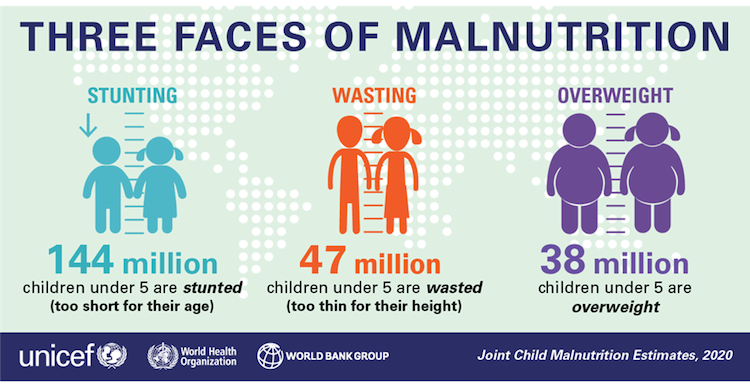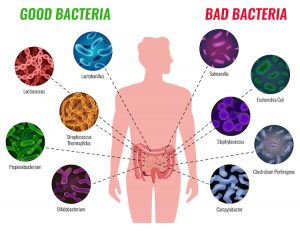
Can the gut microbiome combat childhood undernourishment?
Childhood malnutrition is a global health challenge that occurs when children are unable to consume the right amount of high-quality protein, fats, carbohydrates, vitamins, and minerals to maintain good health. Malnutrition includes both undernutrition (lack of calories, protein or nutrients) and overnutrition or obesity (too many calories). Although both are growing health crises, we’re going to focus on undernutrition.
Undernutrition: causes and current treatments
Nearly half of all deaths worldwide in children under the age of five are caused by undernutrition. Many families across the world cannot afford or gain access to enough nutritious foods like fresh fruit and vegetables. Instead, food and drinks high in fats, sugar, and salt are more affordable and readily available.
Undernutrition during the early stages of development can have severe effects on a child’s growth and intellectual development. ‘Stunting’, also called chronic malnutrition, occurs when children stop growing and have a low height for their age. ‘Wasting’, also called acute malnutrition, is diagnosed when children experience extreme weight loss and have a low weight for their height. Globally in 2020, it is estimated that 149 million children under the age of five experienced ‘stunting’ and 45 million experienced ‘wasting’ due to undernutrition. 
Ready-to-use therapeutic food (RUTF) is the standard way of treating undernutrition. RUTFs deliver nutrients that children require during development and help reverse dietary deficiencies and gain weight. Undernourished children who receive these foods are less likely to die. However, RUTFs don’t appear to reverse long-term consequences of undernutrition, including stunted growth, impaired immunity and reduced cognitive function.
It is estimated that the COVID-19 pandemic will increase the childhood mortality rate due to undernutrition by more than 20 percent. There is a need for more effective and long-lasting solutions to undernourishment. A team of researchers has shown that malnourished children have underdeveloped gut microbiomes and targeting the microbiome may be an effective treatment for undernourishment.
What is the microbiome?
Trillions of microorganisms including bacteria, viruses, and fungi live on and inside each one of us. Collectively, we refer to them as the microbiome. Although many organs in our bodies are home to microorganisms, the largest numbers are found in our small and large intestines.
 There are hundreds of distinct microbial species in the gut that can affect our bodies in both health and disease. Some are beneficial , like bacteria that help break down fiber. A few like Salmonella and E. coli can be harmful.
There are hundreds of distinct microbial species in the gut that can affect our bodies in both health and disease. Some are beneficial , like bacteria that help break down fiber. A few like Salmonella and E. coli can be harmful.
Under normal circumstances, helpful and harmful microbes coexist in the gut without problems. However, when the balance of microbial species is disturbed by infectious illness, certain diets, or excessive use of antibiotics, the body may become more susceptible to disease. Several diseases are thought to be influenced by the gut microbiome, including cardiovascular disease, cancer, irritable bowel syndrome, autoimmune disorders, and autism spectrum disorder.
Microbiologist Jeffrey Gordon, MD, and his colleagues have potentially connected another disorder to microbial dysfunction—undernourishment. By sampling fecal matter from children in different countries, they found that the gut microbiomes of undernourished children appeared stunted compared to those of healthy children who accumulated a particular set of gut microbes during the first two years of life.
When gut microbes from undernourished children were transferred to mice, the mice developed metabolic dysfunctions. Like the children, the mice broke down amino acids instead of sugar for energy, and their rate of weight gain and bone growth slowed. This strongly suggests a link between an altered microbiome and stunting and wasting. Accordingly, Gordon and his team wondered if they could use children’s diets to encourage the growth of healthy gut bacteria, restoring the microbial balance and promoting growth and weight gain.
Microbiota-directed food supplement
Gordon’s team conducted studies to pin down which foods might supply the best fuel for an undernourished child’s gut microbiome. They tested different foods in animal models to see how changes in the gut microbiome correlated with growth. Because of positive results in animal models, the research team initiated a small trial in children.
The trial took place in the urban slum Mirpur, Bangladesh. The researchers monitored 118 children under the age of two with moderate undernutrition. Half of the children received the standard calorie-dense supplemental food while the other half received the microbiota-directed supplement. The dietary supplement designed for Mirpur includes locally available ingredients including chickpeas, soy flour, peanuts, green bananas, oil and sugar.
Despite the fact that the microbiota-directed supplement contained fewer total calories, those children gained more weight and grew more rapidly than the group receiving the standard food supplement. Additionally, their gut bacteria better matched those of healthy children by the end of the trial. The team identified 21 types of bacteria that appeared to be linked to significant growth gains, as well as two types of bacteria associated with poor growth. The microbiome-nourished children also had increased levels of blood proteins associated with bone growth and brain development.
Although this is a promising proof of concept study, the weight gains were relatively small and the researchers still need to prove a direct link to the altered microbiome. The children are being followed to see how they grow over time and to determine if the short-term improvements offset the lasting effects of early life malnutrition.
To schedule a media interview with Dr. Neil Lamb or to invite him to speak at an event or conference, please contact Lara Burhenn by email at lburhenn@hudsonalpha.org or by phone: Office (256) 327-5216 | Cell (256) 937-8210


